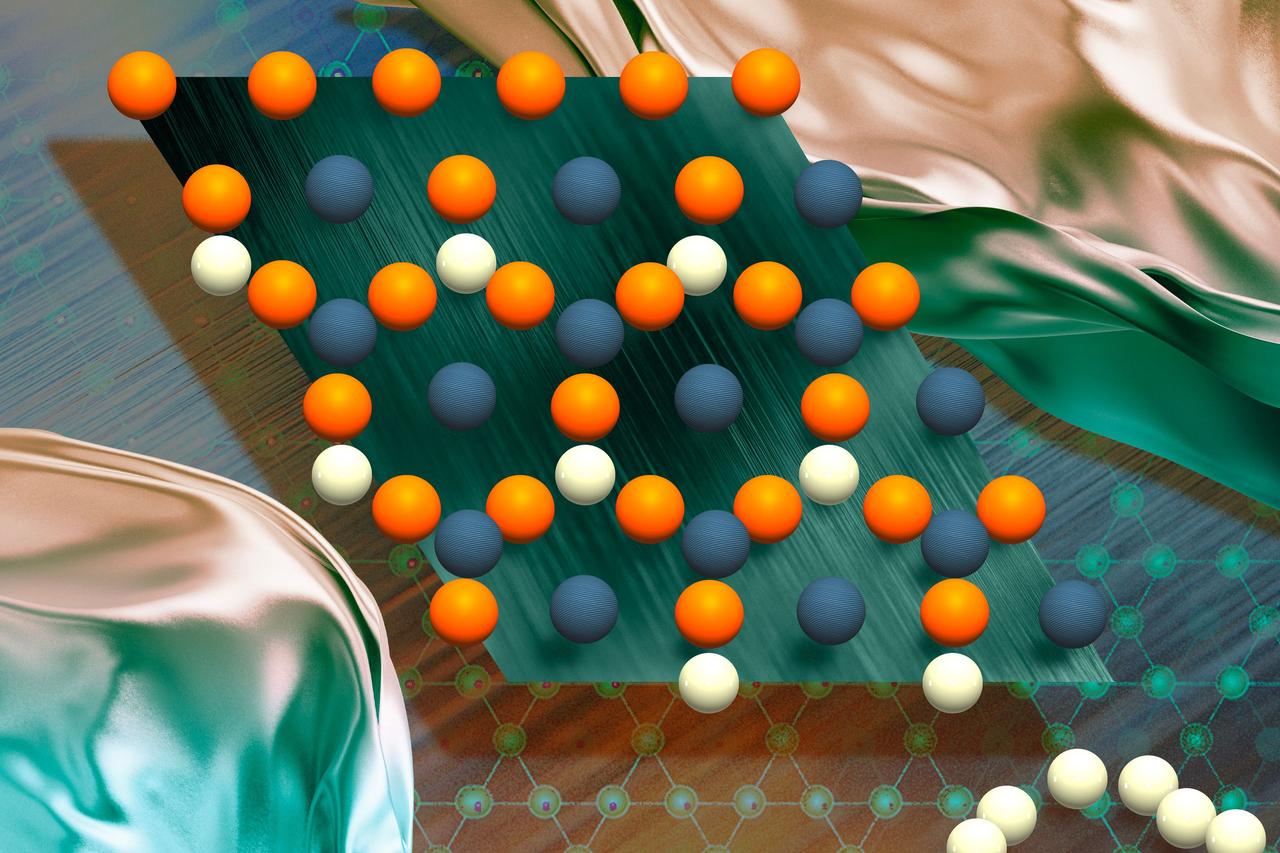Microsoft's MatterGen: AI-Powered Material Design Breakthrough
3 Sources
3 Sources
[1]
Microsoft's New AI Model Can Help Design Better Batteries, Semiconductors
Microsoft has released MatterGen's source code on GitHub The open-source AI model is available with an MIT licence MatterGen is a diffusion-based generative AI model Microsoft researchers unveiled a new artificial intelligence (AI) model last week that can design new inorganic materials with desired properties. Dubbed MatterGen, the open-source large language model (LLM) is currently available in the public domain. The researchers have also published a paper highlighting that the technology can be used to accelerate the material design of new energy sources, semiconductors, and carbon capture. MatterGen has a diffusion-based architecture that is also the foundation for AI models such as OpenAI's Dall-E and Stability AI's Stable Image Ultra. Typically, generative AI models are associated with the generation of text, images, audio, and video based on prompts made by human users. However, MatterGen is different from the usual large language models, as detailed in a post last week. It can take requirements from a user and then generate a wide range of inorganic material designs. Material design currently is a slow and methodical process where scientists use their knowledge and intuition to create better designs. An example of material design innovation is the recent usage of lithium carbide batteries in smartphones that allow a larger capacity while using less space. However, one downside of human-generated designs is that the experimentation and creation process takes a long time. MatterGen, on the other hand, can generate crystalline structures across the periodic table, and even combine different elements. The model works on an atomic scale and can refine atom types, coordinates, as well as the periodic lattice. It can generate material designs at a high speed while running simulation-based experiments on them to determine each design's viability, efficiency, and durability. The researchers stated that a diffusion architecture was used to build this AI model. This type of architecture is generally seen in image and video generation models, as it has a better spatial and geometric understanding of shapes and designs. In a paper published in the Nature journal, the researchers revealed that the base model was trained on a large dataset of more than 6,00,000 stable inorganic crystal structures. The dataset was compiled from the Materials Project and Alexandria databases. Next, adapter modules were added to enable fine-tuning for specific properties. This will allow scientists to add criteria such as specific chemical composition or magnetic density. Currently, MatterGen's source code is available to download and build upon in a GitHub listing. The AI model is available with an MIT license, which allows for both academic and commercial usage. The researchers believe this AI model can significantly benefit the world by accelerating the discovery of new materials for a variety of applications.
[2]
Microsoft Unveils MatterGen, an AI Breakthrough for Materials Discovery
Microsoft on Thursday launched MatterGen, a generative AI tool designed to revolutionise how we understand material discovery, marking a transformative moment in materials science. "Our MatterGen model applies generative AI to create new compounds with unprecedented precision," said Satya Nadella, chairman and CEO at Microsoft. Unlike traditional approaches that test existing materials, MatterGen can generate entirely new ones based on specific requirements. The researchers detailed this breakthrough in their paper 'A generative model for inorganic materials design.' "MatterGen offers a paradigm shift," said senior researchers Claudio Zeni, Robert Pinsler, Daniel Zügner, Andrew Fowler, and others. Traditional methods reach a limit of 40 candidates when looking for materials with specific properties, such as high compression resistance. MatterGen, however, discovered over 100 potential candidates in tasks such as identifying stable, high-bulk modulus structures. The AI is also trained on extensive datasets, including the Materials Project and Alexandria databases, to ensure state-of-the-art performance. The model uses an innovative algorithm to handle complex material structures more accurately. The tool's capabilities were tested in collaboration with Prof. Li Wenjie's team at the Shenzhen Institutes of Advanced Technology (SIAT) of the Chinese Academy of Sciences. They challenged MatterGen to design a material with specific compression resistance (200 GPa bulk modulus). The result? A new material called TaCr₂O₆ was successfully synthesised and matched the AI's predictions, even accounting for variations in how the tantalum (Ta) and chromium (Cr) atoms were arranged. Christopher Stiles from the Johns Hopkins University Applied Physics Laboratory highlighted the significance of the innovation: "We are interested in understanding the impact that MatterGen could have on materials discovery." MatterGen's developers have released its source code under the MIT license, encouraging community collaboration. Researchers aim to expand the tool's applications in fields such as battery and magnet development. The integration of MatterGen with AI simulation tools like MatterSim further accelerates material exploration and simulation, creating a dynamic system for scientific discovery. Materials discovery not only began with Microsoft, but Google DeepMind also released research titled 'Scaling deep learning for material discovery' in 2023, where they discovered 2.2 million new crystals, equivalent to 800 years of work of knowledge. Meta also entered material size by releasing a massive data set called Open Materials 2024 (OMat24), which contained over 118 million examples of material simulations and structures. It focused on a wide range of inorganic bulk materials to improve AI-enabled material discovery. In December last year, Amazon also announced a multi-year partnership with Orbital Materials to develop new materials that help decarbonise data centres using their 'proprietary AI platform'.
[3]
Microsoft just built an AI that designs materials for the future. Here's how it works.
Join our daily and weekly newsletters for the latest updates and exclusive content on industry-leading AI coverage. Learn More Microsoft Research introduced a powerful new artificial intelligence system today that generates novel materials with specific desired properties, potentially accelerating the development of better batteries, more efficient solar cells, and other critical technologies. The system, called MatterGen, represents a fundamental shift in how scientists discover new materials. Rather than screening millions of existing compounds -- the traditional approach that can take years -- MatterGen directly generates novel materials based on desired characteristics, similar to how AI image generators create pictures from text descriptions. "Generative models provide a new paradigm for materials design by directly generating entirely novel materials given desired property constraints," said Tian Xie, principal research manager at Microsoft Research and lead author of the study published today in Nature. "This represents a major advancement towards creating a universal generative model for materials design." How Microsoft's AI engine works differently than traditional methods MatterGen uses a specialized type of AI called a diffusion model -- similar to those behind image generators like DALL-E -- but adapted to work with three-dimensional crystal structures. It gradually refines random arrangements of atoms into stable, useful materials that meet specified criteria. The results surpass previous approaches. According to the research paper, materials produced by MatterGen are "more than twice as likely to be novel and stable, and more than 15 times closer to the local energy minimum" compared to previous AI approaches. This means the generated materials are both more likely to be useful and physically possible to create. In one striking demonstration, the team collaborated with scientists at China's Shenzhen Institutes of Advanced Technology to synthesize a new material, TaCr2O6, that MatterGen had designed. The real-world material closely matched the AI's predictions, validating the system's practical utility. Real-world applications could transform energy storage and computing The system is particularly notable for its flexibility. It can be "fine-tuned" to generate materials with specific properties -- from particular crystal structures to desired electronic or magnetic characteristics. This could be invaluable for designing materials for specific industrial applications. The implications could be far-reaching. New materials are crucial for advancing technologies in energy storage, semiconductor design, and carbon capture. For instance, better battery materials could accelerate the transition to electric vehicles, while more efficient solar cell materials could make renewable energy more cost-effective. "From an industrial perspective, the potential here is enormous," Xie explained. "Human civilization has always depended on material innovations. If we can use generative AI to make materials design more efficient, it could accelerate progress in industries like energy, healthcare, and beyond." Microsoft's open source strategy aims to accelerate scientific discovery Microsoft has released MatterGen's source code under an open-source license, allowing researchers worldwide to build upon the technology. This move could accelerate the system's impact across various scientific fields. The development of MatterGen is part of Microsoft's broader AI for Science initiative, which aims to accelerate scientific discovery using artificial intelligence. The project integrates with Microsoft's Azure Quantum Elements platform, potentially making the technology accessible to businesses and researchers through cloud computing services. However, experts caution that while MatterGen represents a significant advance, the path from computationally designed materials to practical applications still requires extensive testing and refinement. The system's predictions, while promising, need experimental validation before industrial deployment. Nevertheless, the technology represents a significant step forward in using AI to accelerate scientific discovery. As Daniel Zügner, a senior researcher on the project, noted, "We're deeply committed to research that can have a positive, real-world impact, and this is just the beginning."
Share
Share
Copy Link
Microsoft unveils MatterGen, an open-source AI model that revolutionizes inorganic material design, potentially accelerating advancements in energy storage, semiconductors, and carbon capture technologies.

Microsoft Unveils MatterGen: A Game-Changer in AI-Powered Material Design
Microsoft Research has introduced MatterGen, a groundbreaking artificial intelligence model that promises to revolutionize the field of materials science. This open-source large language model (LLM) is designed to generate new inorganic materials with specific desired properties, potentially accelerating advancements in various industries
1
2
3
.How MatterGen Works
MatterGen employs a diffusion-based generative AI architecture, similar to those used in image and video generation models like DALL-E and Stable Diffusion. This architecture provides a better spatial and geometric understanding of shapes and designs, making it ideal for material design
1
3
.The AI model was trained on a dataset of over 600,000 stable inorganic crystal structures compiled from the Materials Project and Alexandria databases. It can generate crystalline structures across the periodic table, combine different elements, and refine atom types, coordinates, and periodic lattices
1
2
.Advantages Over Traditional Methods
Traditional material design is a slow, methodical process relying on human knowledge and intuition. MatterGen offers several advantages:
- Speed: It can generate and simulate material designs at a high speed
1
. - Novelty: Materials produced by MatterGen are more than twice as likely to be novel and stable compared to previous AI approaches
3
. - Precision: Generated materials are more than 15 times closer to the local energy minimum, indicating better physical feasibility
3
. - Flexibility: The model can be fine-tuned for specific properties, such as particular crystal structures or electronic characteristics
3
.
Real-World Validation
In collaboration with Prof. Li Wenjie's team at the Shenzhen Institutes of Advanced Technology, MatterGen was challenged to design a material with a specific compression resistance (200 GPa bulk modulus). The AI successfully designed a new material, TaCr₂O₆, which was then synthesized and found to match the AI's predictions closely
2
3
.Potential Applications
MatterGen's capabilities could have far-reaching implications for various industries:
- Energy storage: Designing better battery materials for electric vehicles
1
3
. - Semiconductors: Improving efficiency and performance of electronic devices
1
. - Carbon capture: Developing materials to combat climate change
1
. - Renewable energy: Creating more efficient solar cell materials
3
.
Related Stories
Open-Source Approach and Industry Impact
Microsoft has released MatterGen's source code on GitHub under an MIT license, encouraging collaboration and innovation within the scientific community
1
2
. This open-source approach could accelerate the adoption and improvement of the technology across various fields.The integration of MatterGen with other AI simulation tools, such as MatterSim, further enhances its potential for scientific discovery
2
. Industry experts, including Christopher Stiles from the Johns Hopkins University Applied Physics Laboratory, have expressed interest in understanding MatterGen's impact on materials discovery2
.AI in Materials Science: A Growing Trend
MatterGen is part of a broader trend of AI applications in materials science. Other tech giants have also made significant contributions:
- Google DeepMind: Discovered 2.2 million new crystals using deep learning
2
. - Meta: Released the Open Materials 2024 (OMat24) dataset containing over 118 million examples of material simulations and structures
2
. - Amazon: Partnered with Orbital Materials to develop new materials for data center decarbonization
2
.
As part of Microsoft's AI for Science initiative, MatterGen represents a significant step forward in using AI to accelerate scientific discovery. While the path from computationally designed materials to practical applications still requires extensive testing and refinement, the technology shows immense promise for transforming industries and driving innovation in material design
3
.References
Summarized by
Navi
Related Stories
Recent Highlights
1
ByteDance Faces Hollywood Backlash After Seedance 2.0 Creates Unauthorized Celebrity Deepfakes
Technology

2
Microsoft AI chief predicts artificial intelligence will automate most white-collar jobs in 18 months
Business and Economy

3
Google reports state-sponsored hackers exploit Gemini AI across all stages of cyberattacks
Technology








